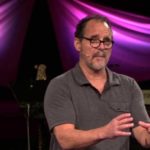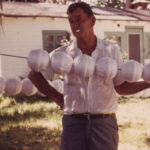We run our website the way we wished the whole internet worked: we provide high quality original content with no ads. We are funded solely by your direct support. Please consider supporting this project.

Does the Lord “Devastate” the Earth?
There is this passage that has sometimes been labeled “Isaiah’s Little Apocalypse” that proclaims how the Lord will “lay waste,” “destroy,” and “ruin” the earth. (The following builds on this previous post which identifies a dual speech pattern of God). It begins with:
The LORD is going to lay waste the earth
and devastate it;
he will ruin its face and scatter its inhabitants (24:1).
Isaiah goes on to decry that “the earth will be completely laid waste and totally plundered” (Isa 24:3) because it has been “defiled by its people” who “have disobeyed the laws” and “broken the everlasting covenant” (vs. 5). Isaiah declares that “a curse consumes the earth” and “its people must bear their guilt” (vs. 6). When free moral agents fall, all that is under their authority falls with them.
Thus far a reader would be justified in assuming that the Lord himself was going to bring about the massive destruction Isaiah speaks of. We get a very different impression, however, if we continue reading, for we soon discover how the Lord planned on bringing about this curse. Relying on the typical ANE conception of anti-creational forces as hostile waters, and using language that is reminiscent of the reversal-of-creation flood account in Genesis, Isaiah proleptically declares:
The floodgates of the heavens are opened,
the foundations of the earth shake.
The earth is broken up,
the earth is split asunder,
the earth is violently shaken (Isa 24:18-9).
These passages indicate that way Yahweh curses the earth is simply by removing the protection (the “floodgates”) that had previously kept hostile cosmic forces at bay. And it is important to notice that, while Yahweh allows these forces to carry out their malevolent designs as a consequence of people’s rebellion, there is no suggestion in this or any other passage that God wanted these forces to be the way they are or that God causes these forces to engage in this destructive activity. To the contrary, Isaiah immediately adds that, once this judgment is complete, Yahweh will “punish the powers in the heavens” and will once again “shut them up” in a “dungeon” and a “prison” (vs. 22).
Just as we have seen God does with violent kings and wicked nations, the sovereign God makes wise use of evil agents as he finds them. But we must never misinterpret God’s willingness to use wicked cosmic forces, wicked nations, and violent kings as indicating his approval of their violence. For as God does in this passage, and as we have seen him do throughout Scripture, once God is done allowing these agents to carry out their destruction, God turns around and punishes them for being the kind of agents he could use for this purpose.
In any event, though it is clear that Yahweh judges the earth in Isaiah 24 by merely withdrawing protection, Isaiah nevertheless depicts him as actively cursing the earth. This passage thus illustrates once again the dual speech pattern that we’ve been discussing. Reflecting his culturally conditioned mindset in which ascribing violence to God was considered the highest form of praise, Isaiah depicts Yahweh doing what in in truth merely allowed.
Photo credit: _Hadock_ via Visual Hunt / CC BY-NC-ND
Category: General
Tags: Cruciform Theology, Judgment
Topics: Interpreting Violent Pictures and Troubling Behaviors
Related Reading

Why a “Christocentric” View of God is Inadequate: God’s Self-Portrait, Part 5
I’m currently working through a series of blogs that will flesh out the theology of the ReKnew Manifesto, and I’m starting with our picture of God, since it is the foundation of everything else. So far I’ve established that Jesus is the one true portrait of God (See: Part 1, Part 2, Part 3, Part 4).…

Reflections on Divine Violence in the Old Testament
As some of you know, for the last five years I’ve been working on a book addressing the problem of divine violence in the OT. (For alleged violence in the NT, see Thomas R. Yoder Neufeld, Killing Enmity: Violence in the New Testament (Baker Academic, 2011). It will be a highly academic tome, approximately 600…

Podcast: How Do You Make Sense of the Killing of Ananias and Sapphira?
Greg considers: “Who actually killed Ananias and Sapphira.” This ancient murder mystery has enormous theological implications! Listen as Inspector Boyd hunts for clues and builds a most compelling case. http://traffic.libsyn.com/askgregboyd/Episode_0108.mp3 Photo credit: jean louis mazieres via VisualHunt.com / CC BY-NC-SA

Revolting Beauty
In this sermon clip, Greg shares the story of how foster parents entered into the pain of a severely abused child and demonstrated compassion rather than judgment when she displayed puzzling and revolting behaviors. This moving story illustrates the way that God enters into our sin and our curse on the cross, and gives us…

Who Curses the Earth?
After the “fall” of Adam and Eve in the Garden of Eden, their sin results in a five curses: on nature, on marriage, on human life, on the serpent, and on women during childbirth. Who is it exactly that afflicts the world with these curses? While the author speaks about the curses on nature (Gen…

Podcast: Doesn’t Claiming that the Old Testament Writers were Sometimes Wrong Inevitably Lead to a Slippery Slope?
Greg talks about cataphatic prayer and the role of the imagination. http://traffic.libsyn.com/askgregboyd/Episode_0470.mp3
